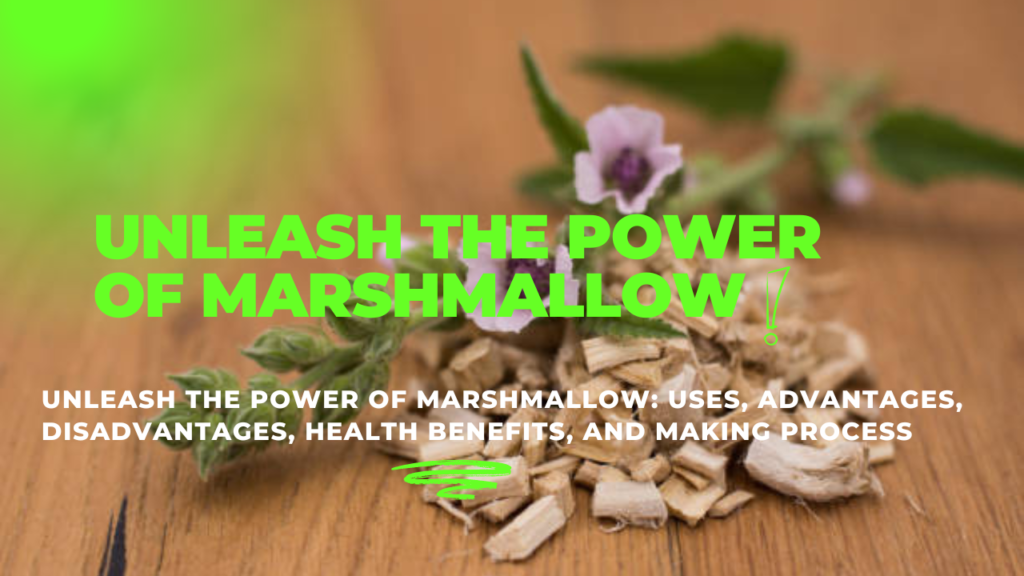Marshmallow plant is more than nothing but a fluffy, sugary treat; it has frequently been used for medicinal purposes. The roots, leaves, and flowers of the marshmallow plant, officially known as the Althaea officinalis plant, provide a number of health benefits. Applications, advantages, disadvantages, and ways to prepare marshmallows are all covered.

Table of Contents
Understanding Marshmallow
Marshmallow is a perennial herb that is native to Northern Africa, Western Asia, and Europe. It has traditionally been employed in traditional medicine due to its beneficial properties. The plant’s mucilage, a thick, sticky substance, is especially helpful in treating illnesses that irritate and inflame the skin and mucous membranes.
Uses of Marshmallow
Marshmallows can be beneficial in both medicinal and non-medical contexts. Here are a handful of the principal uses:
- Respiratory Relief: Marshmallow roots have been used traditionally to relieve respiratory ailments such as colds, coughs, and sore throats. By coating the throat, its mucilage reduces inflammation and discomfort.
- Digestive Aid: It can aid with digestive challenges such as gastritis, ulcers, and a condition called irritable bowel syndrome (IBS). Marshmallow’s calming qualities shield the lining of the intestines and stomach.
- Skin Health: Eczema, psoriasis, and dermatitis are among the skin diseases that marshmallow is used to treat in ointments and lotions. It works well for calming and repairing the skin because of its anti-inflammatory and moisturising qualities.
- Wound Healing: Because the plant possesses anti-inflammatory and pro-healing properties, it has been used to treat burns, wounds, and bug bites.
- Urinary Health: Marshmallow relieves irritation and inflammation in the urinary tract, which helps prevent urinary tract infections (UTIs).
Advantages of Using Marshmallow
Because of their beneficial qualities and adaptability, marshmallows are a practical instrument with a number of benefits.
- Natural and secure: It has long been known that marshmallows are a safe and natural medication. Most people are able to endure it rather well.
- Anti-inflammatory: Marshmallow’s anti-inflammatory qualities enable it to be used effectively in the treatment of numerous ailments.
- Protective and calming: Marshmallow mucilage coats injured tissues in a protective and calming manner, aiding in the healing process.
- Many Uses: Marshmallow has multiple uses and can be found in beverages, tinctures, pills, ointments, and lotions.
- Simple to Grow: Marshmallow is a somewhat simple plant to grow in a home garden, making it a convenient way to get this helpful herb.
Disadvantages and Precautions
While marshmallow is generally considered safe, there are some potential drawbacks and precautions to keep in mind:
- Allergic Reactions: Although uncommon, some individuals may experience allergic reactions to marshmallow. It’s recommended to test a small amount first to ensure there are no adverse effects.
- Interactions with Medications: Marshmallow may affect the absorption of certain medications. To avoid interference, it’s advisable to take marshmallow at least an hour before or after other medications.
- Dosage and Form: The effectiveness of marshmallow can vary based on the form and dosage. It’s important to follow recommended guidelines and consult with a healthcare professional for proper use.
- Pregnancy and Breastfeeding: There is limited research on the safety of marshmallow during pregnancy and breastfeeding. It is best to consult with a healthcare provider before using marshmallow during these times.
Health Benefits of Marshmallow
Marshmallow offers a variety of health benefits due to its rich content of mucilage, flavonoids, and other valuable compounds. Some notable benefits include:
- Eases Respiratory Problems: Marshmallow root tea can soothe coughs, sore throats, and bronchitis by creating a protective coating on the mucous membranes, helping to reduce irritation.
- Enhances Digestive Health: It supports digestive wellness by forming a protective barrier on the digestive tract lining, aiding in the relief of heartburn, ulcers, and colitis.
- Improves Skin Health: Creams and ointments containing marshmallow extract can help alleviate inflammation, redness, and itching, especially in cases of eczema and dermatitis.
- Speeds Up Wound Healing: Its anti-inflammatory and antimicrobial properties promote faster wound healing and reduce the risk of infections.
- Provides UTI Relief: Marshmallow can calm the urinary tract, offering relief from the discomfort of burning sensations often associated with UTIs.
- Reduces Inflammation: Marshmallow’s anti-inflammatory properties make it beneficial for managing a range of inflammatory conditions.

Making Marshmallow Preparations
There are several ways to prepare and use marshmallow for its medicinal benefits. Here are some common methods:
Marshmallow Root Tea Recipe
Ingredients:
- 1-2 tablespoons of dried marshmallow root
- 1 cup of water
Instructions:
- Add the dried marshmallow root to a cup.
- Boil water and pour it over the marshmallow root.
- Allow the mixture to steep for 10–15 minutes.
- Strain the tea and enjoy it warm.
Marshmallow Root Syrup
Ingredients:
- 1 cup dried marshmallow root
- 4 cups water
- 1 cup honey
Instructions:
- In a pot, combine the dried marshmallow root and water.
- Bring the mixture to a boil, then reduce the heat and let it simmer for 20–30 minutes.
- Strain the liquid to remove the marshmallow root.
- Return the strained liquid to the pot and stir in the honey.
- Gently heat the mixture until the honey is fully dissolved.
- Allow it to cool, then transfer the syrup to a glass jar for storage.
Marshmallow Root Tincture
Ingredients:
- 1 part dried marshmallow root
- 2 parts vodka or another high-proof alcohol
Instructions:
- Fill a jar with dried marshmallow root.
- Pour the alcohol over the root until it’s completely covered.
- Seal the jar and store it in a cool, dark place for 4-6 weeks, shaking occasionally.
- Strain the mixture and transfer the liquid into a dark glass bottle for storage.
Marshmallow Root Poultice
Ingredients:
- 1-2 tablespoons dried marshmallow root
- Water
Instructions:
- Mix the dried marshmallow root with enough water to create a thick paste.
- Apply the paste to the affected area.
- Cover it with a clean cloth and leave it on for 15-20 minutes.
- Rinse off with warm water.
Also Read:
Incredible Benefits of Aloe Vera: Nature’s Healing Wonder
Evening Primrose Flower (Oenothera): How To Use Evening Primrose Oil To Induce Labor
Benefits of Turmeric for Skin: How to Make Turmeric Home Remedies?
English Lavender Insights: Growing Tips, Seeds and benefits
FAQs
What is Marshmallow, and where does it come from?
Marshmallow is a plant known as Althaea officinalis. It grows in Europe, Western Asia, and Northern Africa. It has been used for its medicinal properties for centuries.
What are the main uses of marshmallow?
Marshmallow is used to help with respiratory issues like coughs and sore throats, digestive problems such as ulcers and IBS, skin conditions like eczema, wound healing, and urinary tract infections.
What makes Marshmallow effective in treating these conditions?
Marshmallow contains mucilage, a thick, gooey substance that coats and soothes irritated tissues, reducing inflammation and promoting healing.
How can Marshmallow help with respiratory issues?
Marshmallow root tea can coat the throat and reduce irritation, making it helpful for coughs, colds, and sore throats.
Is marshmallow safe to use?
Yes, marshmallows are generally safe for most people. However, some might be allergic, and it can interfere with the absorption of certain medications. It’s best to consult a healthcare professional if you’re unsure.
Can marshmallow be used during pregnancy or breastfeeding?
There is limited information about its safety during pregnancy and breastfeeding. It’s best to consult a healthcare provider before using marshmallow in these cases.
How does marshmallow benefit digestive health?
Marshmallow forms a protective layer on the lining of the digestive tract, which helps with conditions like heartburn, ulcers, and colitis.
What are the benefits of using marshmallows for skin health?
Marshmallow extract in creams and ointments can reduce inflammation, redness, and itching in skin conditions like eczema and dermatitis.
What are the potential drawbacks of using Marshmallow?
Some people might be allergic to marshmallow, and it can interfere with the absorption of certain medications. Pregnant and breastfeeding women should consult a healthcare provider before use.
Conclusion
Marshmallow is a versatile and beneficial plant with a wide range of medicinal uses. From soothing respiratory and digestive issues to promoting skin health and wound healing, marshmallow offers numerous health benefits. While it is generally safe, it is important to be aware of potential allergies and interactions with medications. By incorporating marshmallow into your wellness routine, you can harness its powerful healing properties and improve your overall health.
Disclaimer: The information provided in this article is for educational and informational purposes only. Always consult with a qualified healthcare provider before using any herbal remedies, essential oils, or supplements
“I’m a woman with a deep knowledge of medicinal plants, dedicated to harnessing the healing power of nature. Excited to share insights, promote wellness, and explore the wonders of herbal remedies.”
